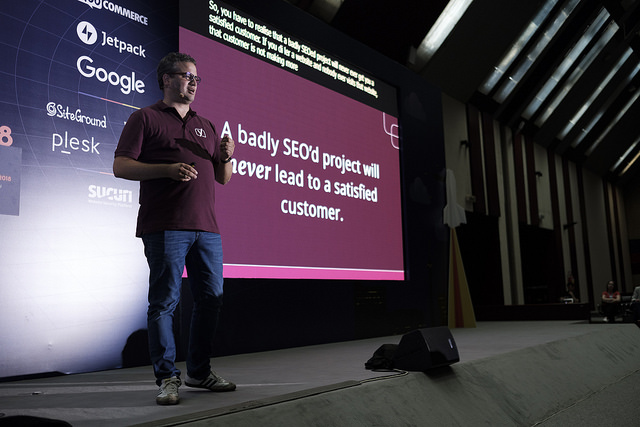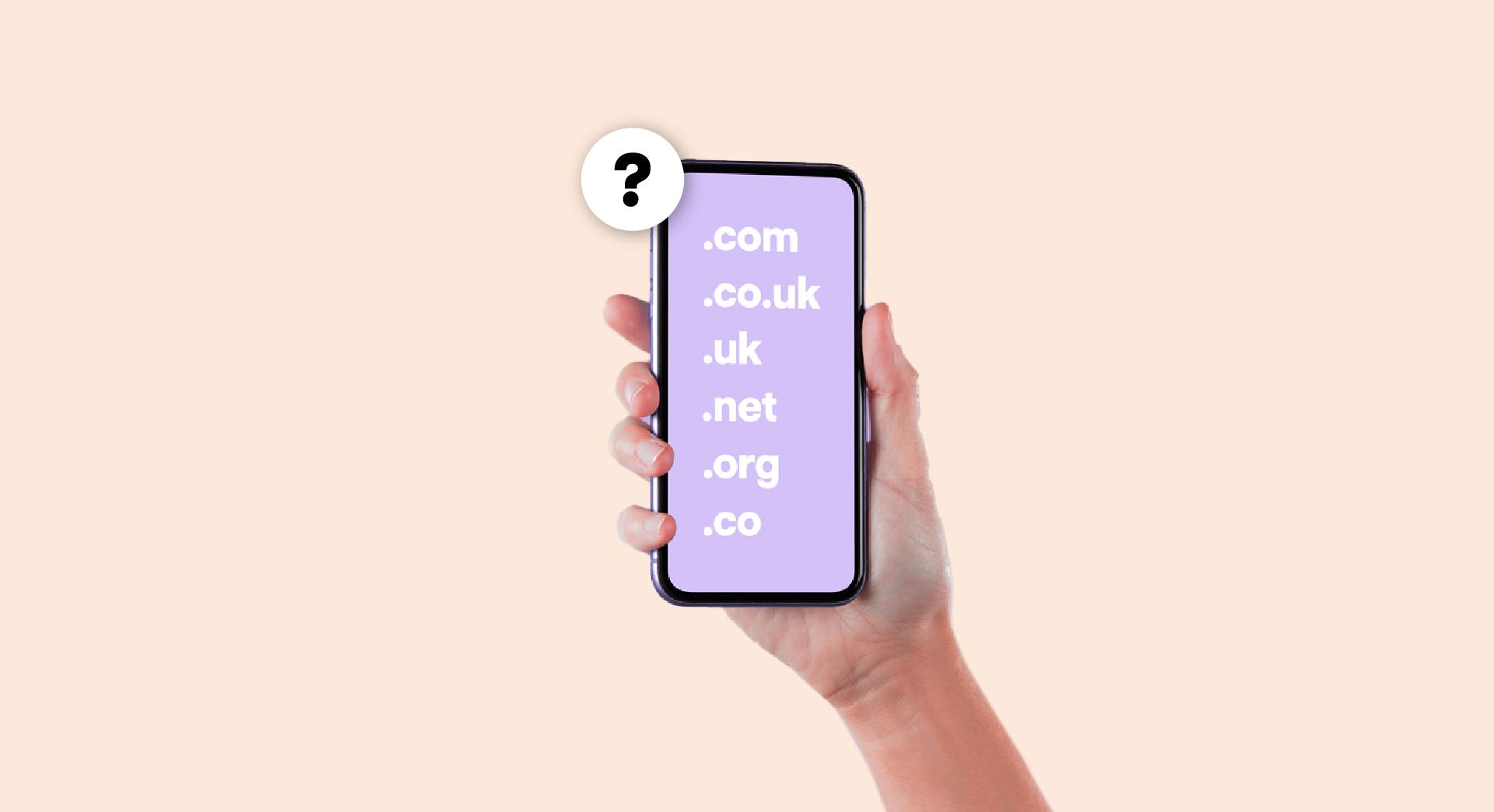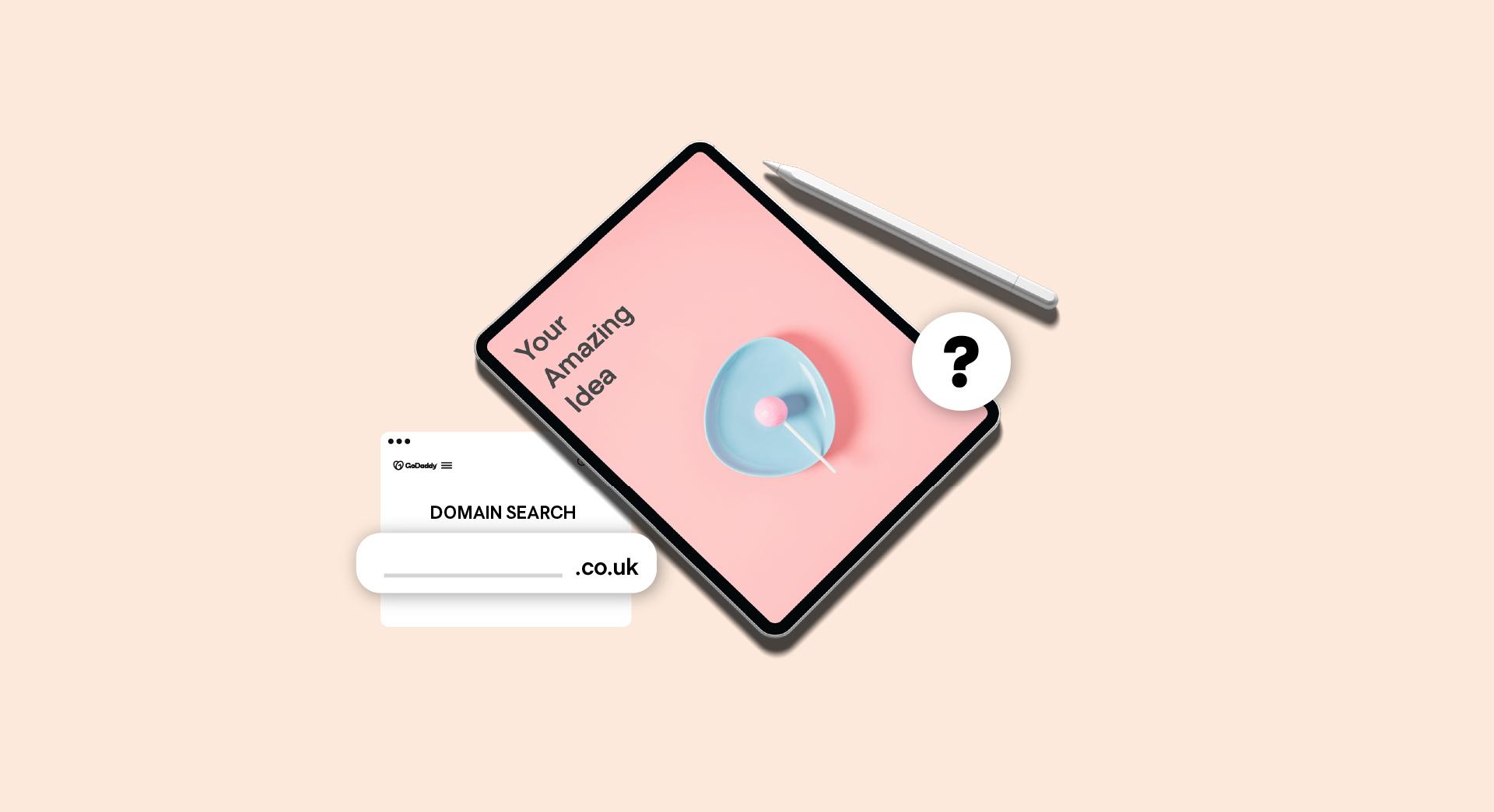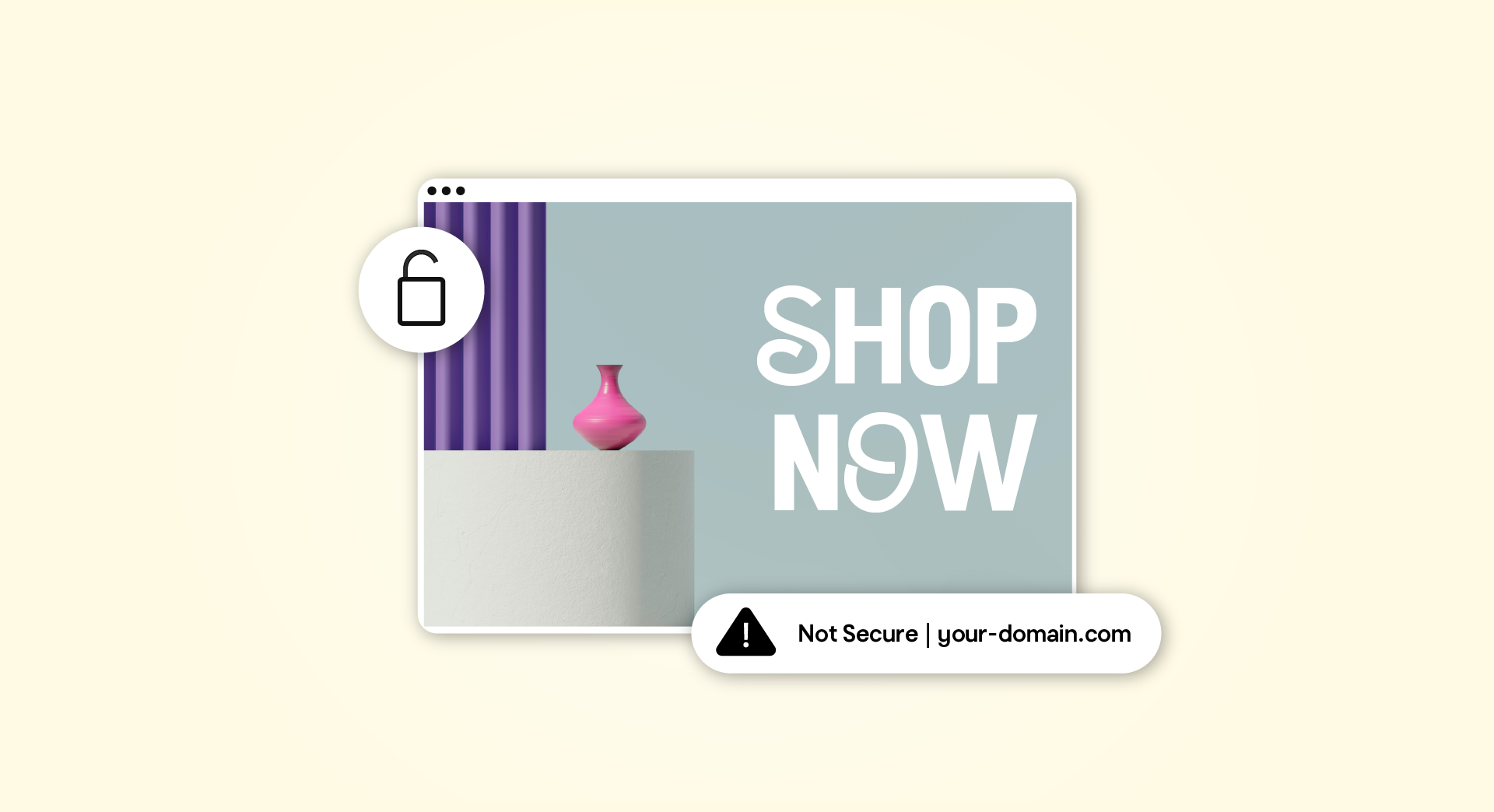Search engine optimization (SEO) can seem a hard thing to do for the average small business owner.
That's why the Yoast SEO plugin for WordPress exists. It helps make SEO for WordPress easier, which increases the chance of your website ranking well.
At WordCamp 2018, GoDaddy had the chance to sit down with Marieke van de Rakt, chief strategy officer at Yoast, and Joost de Valk, CEO of Yoast.
They talked about how small business owners can get to grips with SEO, the future of Yoast and the ways in which SEO has changed over the years.
So instead of instead of me introducing you I'd like you both to introduce yourselves mainly because your last name is hard for an American. And what do you both do?
MR: So I'm Marieke I don't even know what my exact job title is and we had a lot of discussion about that. So think on the website it says chief strategy officer, I do a lot of strategy and I'm in tune with marketing and I'm actually the founder of Yoast Academy so that's what I'm mostly doing
JV: And I'm Joost I'm the CEO and founder of Yoast. My last name is De Valk, but that's hard apparently. I don't do all that much anymore I talk to everyone and get involved in just about everything in the company but I don't have any direct reports.
Okay so when you talk to a small business owner and the small business owner says SEO is not important what do you what do you tell them? Why is SEO important to a small business owner?
JV: It's not necessarily important to everyone. I mean if you're a small business owner and you have a good set of clients and they keep coming up, then I think you're good. I mean, you might not even need a website. If you do need a way of getting new clients then SEO is probably the cheapest way of doing marketing that exists. If you know that people are searching for the service or product that you provide, then optimizing for being found when they search is a very logical thing to do. So that's what SEO is and why I think a lot of companies over the years have made a lot of money by doing it right and just by doing these simple things.
MR: It doesn't make sense to have a website without anyone finding. Without SEO, a website just doesn't make sense.
coursJV: So that's when you start with like the simple things like you're thinking about "what do people search for that I want to be found for".
Yeah. So the search engines that are relevant for SEO are Google anything else?
JV: It depends on where you are. And so in Europe it's Google and nothing else. In some countries it's Google and Yandex for instance. In some countries it's Google and Bing, in the US Bing still has a bit of market share
MR: I think you're forgetting YouTube now. It's a totally different market, but that's what people are searching for.
JV: Yeah, so YouTube and other types of search engine. So if you have a product that you want to sell, getting it on Amazon and selling it there as well is also a way of attracting more people to that product.
A place to discover things and making your website or your product optimal for being discovered. So then would you say that Google is good for small businesses, bad for small Businesses? How is that relationship in your opinion?
JV: I don't think it's good or bad. It is what it is. It is the entrance point for many people to the web and in itself it tries to be fairly neutral.
MR: It does a lot of advertising so if you're in a competitive market, there will be three or four advertisements before the organic results even come in.
JV: So for that that makes it harder. And advertising in Google can become expensive. It depends a bit on what you're selling and what your market is, but I don't think Google in and of itself is good or bad. It's how you use it and how you approach it that determines that more than anything else I think. And Google tries to help small businesses with some of the stuff they do, but sometimes they also make it a lot harder so it's a constant battle.
There's a lot of stuff that you have to do if you want to be search engine ready.
JV: Yeah, especially if you if you want to appear on Google Maps and stuff like that it becomes it hard quite quickly.
So let's talk about the technical aspect of SEO and thinking about a small business owner that might not have somebody technical on staff. What are some pieces of advice you have for hiring a technical SEO or for a small business owner in general that that might need this in their life but doesn't know how to go about getting it?
JV: I think you need WordPress. I think you need Yoast SEO. And if you want to appear in Google Maps you need our local SEO extension so that we can do all that stuff. And I hope that we've made it easy enough so that everyone can just configure that.
MR: So ideally, and of course new things come up, but WordPress is actually really SEO-friendly and then combined with our plugin it's supposed to be that all the technical stuff. And of course I don't think everything is covered…
JV For a normal small site it's we should have everything covered at that point.
So you're taking the kind of a guesswork or the difficulty of hiring out of out of the SEO game?
JV: Yeah. Technical SEO stuff is. I mean it's not something that anyone should be thinking about for a small site. There's just no need.
MR: Then you have the content SEO stuff which is hard as well. That still exists. All the technical things we can fix we with a plugin. We can only help you to the content stuff but not do it for you.
JV: So you still have to write good copy.
MR: And do your keyword research.

What are the takeaways from your talk on internal linking?
MR: I love internal linking, I think it's exciting, because it's the thing you can like you can control. So writing text costs a lot of time, and internal linking is something you can really quickly improve. And I don't say your ranking will improve as quickly as that, but it's something that's active you can own it. So what I what I said in my talk is to really think about which articles are the most important to you, which ones you want to rank. Because if you've got that question wrong, you're ranking with articles that don't give you any new visitors, or don't get visitors to buy your product. So just think about that first, and then if you have an internal linking structure in which you link from, in tiers, the less important articles to that one most important one you'll get that one to rank more.
JV: Even on Yoast.com we regularly see that okay we're ranking number four for that keyword and we'd like to rank number one. Just by adding some internal links from other related posts within the site you can often boost yourself into that spot. So as you're building content over time internal linking becomes more and more important and more powerful.
Is it as important as external links?
JV: So in the original PageRank algorithm which Google published, and how they calculate the value of a page there is no difference between internal and external links. Because a page has a certain value and if that page links out to another page it gives some of its value to that page. And if that page is an internal or external page does not matter to the original algorithm. Now there have been some changes to the algorithm of course but it's very good to realize that inherently the whole system is not built to make it to make a distinction between the two.
What are what are the best resources for small businesses for SEO?
JV: God it's a hard question. The problem is there's a lot of misinformation so we try hard on Yoast.com and in our courses. If you really know nothing it's probably best to start with a course either one of ours, or just pick one on LinkedIn learning or whatever. But we have a free SEO for beginners course. It's because you need a bit of context and once you have that context you can you can read more around it. But if you don't have the context if you're "okay so what is this thing that I'm learning about?" all these articles might scare you more than they and then they actually give you new knowledge.
Yeah so if they tell you to do SEO keyword research and then you're like "oh I got to do all this keyword research" you might find yourself lost?
JV: Yeah SEOs in general are very good at making things sound very hard.
MR: And they're also good at making tools which look like they're doing the trick. But, like, in keyword research you have all those keyword research tools but you have to do the thinking yourself. So you can use like keyword research tools in order to come up with like related keywords. But thinking about - which ones are the words that my audience is using, nobody can do that's for you. So I don't use any tools, but I'm like not a normal person…
JV: The tip I've been giving companies for like the last decade is if you have a customer service department, or even if you take the calls yourself, or if you talk to customers; if they use a word that you would not have thought of, write it down and make your customer service department do that too if they did use a certain word to describe something write those words down. Think about how they describe what you're doing how they describe your product. That is a very hard thing to do. It's also almost impossible to outsource, because other people will not do that right for you.
MR:I think a lot of our advice is focused on "you have to do the hard work" and there are some tools you can use to make it a little bit easier.
JV: Yeah, I always like to say SEO stands for seriously effortful optimization. It's a lot of work. They used to be shortcuts and Google has literally taken them all away.
MR: In English.
JV: Yeah. In other languages you can still spam, but don't, please.
How has SEO changed? Or how has Google changed? Or more generally just search engine tactics or the landscape, how has it changed?
MR: It's changed a lot, I think.
JV: Yeah, so mostly it was very technical and they've become better and better at recognizing how websites work. And they were pretty poor and understanding text and they're getting better and better at understanding text and context. So right now I think we're in an age where you can just throw up a website and if you write good content, and some people write about what you're doing, Google will find it. No tricks needed. And that's very different from five years ago.
MR: Yeah, so nowadays we say feels like a trick, it probably is a trick and you shouldn't do that.
So let's zoom into the future then and think about things like JavaScript and stuff like that is that something that you think will be indexable in the future? Content within that.
JV: So it is already indexable, it just takes a lot more time. To be fair every project I've seen where they use JavaScript can be optimized to do better in search by pre-rendering it. So by giving Google static HTML. Google will get better with that over time but don't place your bets on that just yet. So built normal pages in normal HTML, or maybe even an amp HTML. But don't try to do all too freaky stuff because Google will have trouble with it.
So now thinking five years into the future, maybe even ten years into the future, what does SEO look like? What does your business look like in in that amount of time? Because the Internet's a crazy place I mean it changes all the time.
JV: If only I knew.
MR: So writing remains something that's hard. It's not going to change, it's been that way for thousands of years, so people will still need to help to do that.
JV: This is what we are focusing on a lot on. Helping people write better content and structure that content better across the site.
MR: Content will always remain something we can help peope with.
JV: And I think there's a place for us now and for at least five more years, I don't know ten. But in helping people do structured data right and getting the metadata in the format that search engines want it in. That's not something that search engines are suddenly gonna do like that without needing any help.
MR: And I do think that all websites are getting larger, because companies have been having websites for a long time and they've been and adding content. And then it gets harder to do that right and to structure it right. So structuring your site is something that will remain important, and become more important. At Yoast, we don't ever throw anything away, so now our like our "attic" of the website is full things Yoast wrote in 2004.
JV: Oh yeah, as a website grows older you need to clean up and you need to structure better. So one of our challenges is going from on-page level SEO to website-level SEO. So we've made some steps there with our internal linking and things like that and we can probably do a lot more and we'll do a lot more.
MR: Because nobody's going to throw away their website. That's not smart for your ranking. So then you have like a really big ugly thing.
JV: I think there's a lot to do. And SEO over time has evolved. I've been in this industry for 12 years now and we've gone from a lot of technical tricks to a much more content and structure based approach. Even though the content and structure was already important in the beginning, there was a lot more tricks around that at that time. And now we're just focusing on a lot more different things it'll always evolve.
Can you give us one or two marketing tips?
MR: If you have a website you should know who your audience is. And so doing a little bit of research, you know who they are and what kind of language they use. That's like keyword research and we have training about that, but we don't have it in our tool because it's something you should do yourself, and that's something you should take the time to do.
JV: Yeah, and knowing what you have. So my simple trick for today is go into Google type in "site colon your domain" and type in the keyword that you want to rank for and be astonished by which page shows up as number one. Because usually
Google thinks something else of your website than you do. That's very practical. So as Marieke said think of your audience, think of the keywords they use. Then use one of those keywords to do "site colon your domain name and that keyword" in Google, see what comes up. Which page comes up and if it's not the page you're expecting, go work on your internal linking.
Check out this guide to learn more about the importance of SEO to small businesses.






